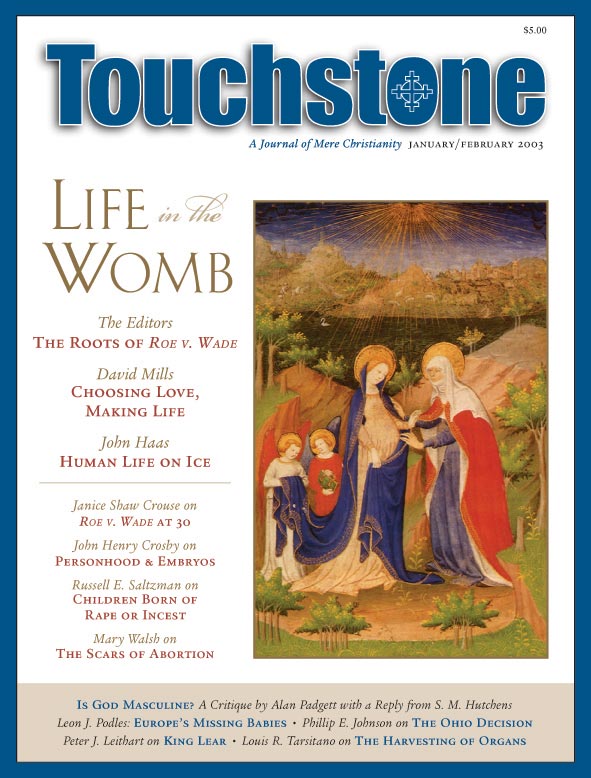The Imperatives of Ignorance
John Henry Crosby on Personhood & the Human Embryo
At the heart of the debates on embryonic stem-cell research and human cloning is the question of the status of the human embryo. Is the embryo a person, or is it not? This is ultimately the crucial question. Any philosophically adequate defense of the moral inviolability of the human embryo must begin with a defense of the “personhood” of the embryo, or at least a defense of the strong and morally binding likelihood that the embryo is indeed a person.
Defenders of the inviolability of the embryo, however, often consider the question superfluous, saying that to be a human being is to be a person. In their view, to be a person is nothing other than to be an individual member of the human species, an individual instance of human nature.
The Christian tradition also offers reasons for taking seriously the question of the inception of human personal life. Thomas Aquinas, for example, was a proponent of the so-called delayed animation theory (also known as delayed “hominization”), which teaches that God infuses the rational or intellectual soul at a point after conception has taken place. If so great a thinker as Aquinas could deny the personhood of the embryo, we cannot just take for granted the opposite position.
Something & Someone
Yet what does it mean to be a person? A simple way to get at this question is to consider the contrast between being something and being someone. The difference is revealed in the fact that we can be alone, even when surrounded by many things, not because a thing is nothing but because it is not someone. Togetherness requires at least two “someones.”
The question of personhood is crucial because of its ethical implications. Although non-persons, “non-someones,” are not without value, no one considers them morally inviolable. While most people do not think that we should torture animals, most also think that we can use animals for food and transportation without an affront to their dignity. On the other hand, it is almost universally acknowledged (and fundamental to the Western ethical tradition) that persons—someones—should not be used or exploited.
Now the difficulty with the embryo is that it does not reveal itself as a person, a someone. It reveals itself as a living organism (that is, capable of directing its own growth and integrating nourishment into itself ), but this does not make it a someone. The world is full of living organisms. They behave in the same manner as the developing embryo, and yet we would never say that they are persons. We all somehow understand that personhood is a “new” reality, not defined simply by being alive.
Biology only captures the objective, thing-like side of human life. The crucial question of whether or not the embryo is a person, a someone, is not one that can be answered just by pointing to the scientific facts. The question remains undecided by all that science has to say. We may presume that the embryo is a person, even love the embryo as a person, albeit a “slumbering person.” Still, deep as these convictions may run, the personhood of the embryo is not manifest in any indubitable way.
Is the embryo a person, a someone? The question can be concretely put: Was I, the someone who exists today, already present from the earliest moments of my being as a living organism, or did I begin at some point after my embryo came to be?
The truth is that we really cannot know, at least not with any demonstrable certainty. Some have taken this ambiguity about the onset of personhood as a reason to go ahead with lethal research. Such reasoning, however, is morally indefensible. Does our ignorance on a matter so fundamental entitle us to a carte blanche for whatever research we wish to pursue? Or, on the contrary, does what we do not know tell us what we, in fact, must do?
In reply to the morally permissive argument, there are two points to be made, the first ontological, the other moral. The ontological proposition holds simply that there is a real (as opposed to an improbable) possibility that the human embryo is in fact a person. The moral point, which follows upon this proposition, simply draws the conclusion that Western moral discourse has always drawn, namely, that this real possibility that the embryo is a person demands that it be treated with the same inviolability with regard to deliberate killing as the human being who is clearly a person.
The Arguments
As for the ontological proposition, there are two arguments to be made for it. The first, which is positive, is that it makes eminent sense to presume that I existed as a person from the first moment of my existence as an embryo. Given that I do not experience my body as extrinsic to myself—as if it were some very special possession of mine—but as of my very substance, it seems highly probable that my being as person should coincide with the start of my physical being.
If this positive argument proves inadequate (or even to beg the question), a second, negative argument cannot so easily be overcome. This is the fact that there is no point after conception that seems a more likely point for the onset of personhood than the completion of reproduction itself, namely, the coming into existence of a new living organism. No point after conception—be it implantation, the formation of the primitive brain stem, or viability—is as radical and complete a beginning as the point at which the embryo comes into being.
Try the following thought experiment. Think of any adult human being—that is, someone who is incontestably a person—and go back to his or her birth. Unless you are ready for infanticide, you have to say that at birth he or she was already a person. Go now back to one week before birth; you cannot find any reason why that human being was a person at birth but not one week earlier. Keep going back; you cannot find any step in fetal development that was clearly the dividing line between being a person and not being one, between being a someone and being a something.
Hence, what is more plausible than to assume that a human organism, which is the same organism as an embryo and as an adult, is also a person throughout its whole life, from the moment of conception on? While the various biological markers may increasingly tell of the kind of being one would expect to be a person, there is no moment along the continuum of embryonic and fetal human life that is definitively the “onset” of personhood. The only clear line is the completion of reproduction.
This thought experiment seems to confirm my ontological proposition, namely, that there is a real possibility that the embryo is a person. Together, these two ontological arguments have the merit of being modest: They do not claim to prove incontrovertibly that the embryo is a person, only that its personhood has to be assumed, because no later point for the beginning of personhood can with certainty be demonstrated.
Several objections can be raised to this view, the most popular of which is that we can reasonably attribute personhood to a developing human being only after it has attained a certain level of biological individuality. The frequency of embryo twinning (when one embryo apparently divides to form two distinct embryos) and fusion (when two embryos either revert or combine to form a single embryo) are often given as evidence that the embryo is not yet an individual.
True, embryonic life is not as unassailably individual as a human organism is even as a fetus, let alone as an adult. The objection is also correct in recognizing that personhood entails a certain level of individuality. But as tenuous as early human individuality may be, it is not so amorphous, so indeterminate, as to be an unlikely or unreasonable bearer of personhood.
The objection overlooks the powerful drive of all living beings from their very first moments to maintain and strengthen their newly received individuality. The remarkable biological individuality of the early embryo is displayed in the way in which it consumes nourishment and integrates this into its rapidly growing body. From the very beginning of its life, it acts as a single organism.
Whatever its merits, the objection fails to undermine the very real possibility that the embryonic human being from its first moments might very well be a fully human person—albeit a “slumbering” person. If anything, the objection only shows that the early and somewhat weaker individuality of the embryonic human being becomes increasingly more resilient and unlikely to suffer dissolution. In the end, there is no compelling reason not to identify the beginning of personhood with the beginning of the living human organism.
Moral Obligation
What does this mean for the moral status of early human life? It means, in effect, that since the embryo might well be a person, killing it might well be the killing of a person, bringing with it the obligation to treat the embryo as if it were a person. At the same time, this argument is of tremendous moral gravity: To contest a total moral ban on the killing of the embryo is to declare oneself willing to kill (or at least willing to risk killing) a human person.
Ignorance about the details of the origins of personal life may seem a flimsy justification for such a stringent moral ban. Yet who would have difficulty recognizing the commonsense quality of this argument if the ignorance were with respect to adults rather than embryos? No one, for example, would question that ignorance over the possible presence of people in a mine would entail a moral prohibition on blasting. It is self-evident.
The argument throws the burden onto our opponents, saying to them in effect: Try to find a later and morally safe beginning of the human person. You will see that it cannot be done conclusively. The only morally responsible course is to go back to the point before which no one thinks there can be a person—for no one thinks the new human being exists before fertilization—and to assume personhood from that point forward.
John Henry Crosby, who is completing his graduate studies in philosophy at Franciscan University of Steubenville, is an analyst at the Family Research Council in Washington, D.C. The views expressed in this article do not necessarily reflect those of the Family Research Council.
subscription options
Order
Print/Online Subscription

Get six issues (one year) of Touchstone PLUS full online access including pdf downloads for only $39.95. That's only $3.34 per month!
Order
Online Only
Subscription

Get a one-year full-access subscription to the Touchstone online archives for only $19.95. That's only $1.66 per month!
bulk subscriptions
Order Touchstone subscriptions in bulk and save $10 per sub! Each subscription includes 6 issues of Touchstone plus full online access to touchstonemag.com—including archives, videos, and pdf downloads of recent issues for only $29.95 each! Great for churches or study groups.
Transactions will be processed on a secure server.
more from the online archives

28.2—March/April 2015
Man, Woman & the Mystery of Christ
An Evangelical Protestant Perspective by Russell D. Moore
calling all readers
Please Donate
"There are magazines worth reading but few worth saving . . . Touchstone is just such a magazine."
—Alice von Hildebrand
"Here we do not concede one square millimeter of territory to falsehood, folly, contemporary sentimentality, or fashion. We speak the truth, and let God be our judge. . . . Touchstone is the one committedly Christian conservative journal."
—Anthony Esolen, Touchstone senior editor








